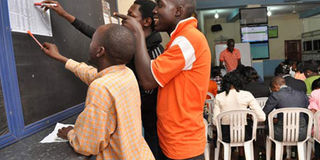Betting among footballers a big problem for the UPL

The biggest practice eating up young, unemployed men in Uganda is betting
What you need to know:
The issue: Betting problem
Our view: Solving the betting problem requires a well-thought out mechanism that can allow betting revenue to exist within the sponsorship framework of football capital.
The biggest practice eating up young, unemployed men in Uganda is betting. It is a common sight in many peri-urban and urban areas throughout the country to find a cluster of people pre-occupying themselves at betting shops.
Even after a few regulations were put in place, enforcement has been a problem. Many unemployed Ugandans will continue wasting away their little savings in the hope of landing a windfall via the lottery of betting.
If that is a concern, spare a thought for the StarTimes Ugandan Premier League (UPL), where a number of players are actively involved in the practice.
Players today are either betting on games or colluding with betting agents to pre-determine incidents in the game or results. Betting is to an extent one of the biggest threat to the integrity of the game in Uganda.
Over the last three seasons, a number of clubs have suspended indefinitely players either implicated or found guilty of collaborating with betting agents.
It is also true that some betting houses in Uganda – and world over – have the local league among the list of matches where punters can stake their money.
When you consider that most players in the Ugandan league are not paid the sort of wages to make them ward off the prying eyes of betting middlemen and agents, then you can appreciate the depth of the mess our game finds itself in.
Admittedly, there is some good that has come football’s way in the last couple of seasons. The game is now televised, fans are slowly, but surely returning to stadiums and sponsorships among clubs are at an all-time high.
Evidently, it is not all doom and gloom.
But if betting among players is not eliminated, the good vibes around the game will be replaced with the integrity challenges of 15 years ago that all but killed a generation of Ugandan football.
Solving the betting problem requires a well-thought out mechanism that can allow betting revenue to exist within the sponsorship framework of football capital.
After all, a number of betting companies sponsor some of the biggest football clubs in Europe. The difference there and here is that the laws are clearly defined on active footballs betting, and the penalties are severe. And when there are culprits, authorities do not pay lip service.
What Ugandan football urgently needs is a stakeholders meeting of the Uganda Premier League to acknowledge, address and arrest the betting problem soonest.




